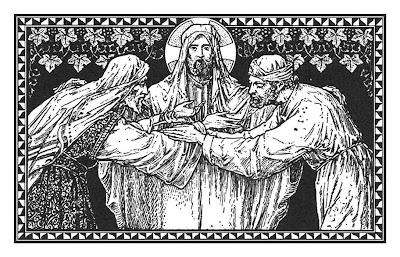
HOW MANY OF YOU MADE SPECIAL vows for Lent?
How many of you are still keeping them?
How many of you are still keeping them, but wish you didn’t have to be still keeping them?
All right, if you didn’t make any special Lenten vows, who all here is sick of winter and wish Spring would come for good?
Most everyone here, it looks like.
All right. How many of you sometimes find it hard to be a Christian?
How many of you wish Jesus would do something to make it not so hard to be a Christian anymore?
Yes, we’d all find that to be a good thing.
All these things-- keeping Lenten vows when you’re tired of keeping them, longing for Winter to turn into Spring, and putting up with difficulties in your Christian life-- all have something in common. They’re all about wishing we could get something unpleasant we’re going through now over with so we can get on to the enjoyable thing we look forward to later.
But the Holy Spirit speaking through the Apostle Peter tells us what we’re going through now is necessary if we want to get what we’re looking forward to later. In other words, a proper cold Winter is necessary if we want the flowers of Spring, and self discipline and endurance are necessary if we want to participate in Christ’s resurrection. When we suffer and endure and discipline ourselves for the sake of Jesus Christ, we are being trained for holiness. We’re learning what it is to be holy, as our Father in heaven is holy.
What is Christian holiness? Is it schlumping around with a long, fake-pious face, telling people what you don’t do and being proud of the fun you don’t have? Do you have to be so above-it-all and unapproachable that ordinary mortals are afraid to bother you with their everyday concerns? Is it wishing you could die right away so you can go to heaven, or floating six inches above the sidewalk because your feet are so pure they don’t touch the ground? If that’s what you think of when you think of being holy, no wonder so many Christians don’t really want to be!
Here’s how Peter describes being holy, up in verse 8:
"Finally, all of you, live in harmony with one another; be sympathetic, love as brothers, be compassionate and humble. Do not repay evil with evil or insult with insult, but with blessing, because to this you were called so you may inherit a blessing."
When you are holy, you’ll be eager to do good, because Jesus Christ has been good to you. You’ll walk around in your every day life treating others the way Christ has treated you. To be holy is to resist the temptation to be disharmonious, unsympathetic, unloving, insensitive, and proud and to practice harmony, sympathy, love, compassion, and humility instead.
Like when? Like when that motorist cuts you off, and you don’t flip him off, instead you feel sorry for him, that he’s in such a hurry to get someplace, and you pray he-- and everyone else on the road with him-- will get there safely. Holiness is when someone has been unjust and hurtful to you, and you calmly and frankly present your case to them, instead of gossiping about them behind their backs. To be holy is to treat your neighbor with the love and grace of Jesus Christ, especially at home and at church-- because sadly, those are the places Christians are tempted the most to let it all go and be as unholy and selfish as they can.
Peter says, "Who is going to harm you if you are eager to do good?" Well, most people, no. For most people, if you’re a truly holy Christian you’ll be a joy to have around. But there will be those who can’t stand anything truly holy, because it exposes just how unholy they themselves are. People like that will take your gentleness for weakness, your sympathy for gullibility, and if you take any stand for truth-- well, to them that’s just your self-righteous arrogance.
Peter speaks more about this problem in his letter. He mentions the unbeliever who can’t understand how you can possibly believe in this crucified Rabbi. To them, respond in holiness, that is, with the wisdom, reasonableness, gentleness, and respect of Jesus Christ.
Then there are those who charge that if you’re doing anything good as a Christian, it’s all a fake and you really must be a hypocrite inside. I got my copy of the Pittsburgh Magazine a couple days ago, and in it I read about a play being put on next month at the City Theatre called The Missionary Position, dealing in part with, quote, "A Christian activist’s unhealthy obsessions."
Well, of course. If you’re a Christian activist, or an active Christian of any kind, you must have unhealthy obsessions. Not just plain human weaknesses and sins, but active evil inside just because you are a Christian. That’s the malicious attitude you’re going to encounter if you truly try to be holy.
But keep on being holy. Keep on blessing where you are cursed. Keep on hoping and praying that Jesus will open the eyes of those who slander you and take away their sins just as He took away yours.
But it’s hard to be holy! And it’s frustrating. If being good is so good, why can’t it feel good now? Why can’t people appreciate your sweet Christianity now? Why do we have to endure Winter to get to Spring, and why is Lent and its discipline so long before we can enjoy the feasting and joy of Easter?
I’m convinced from the Scriptures that the Lord willed it that way, so we would know that our holiness is not from ourselves, but solely from Him.
In Leviticus He says, "I am the Lord, who makes you holy." He commands us to consecrate ourselves and be holy, but it’s a struggle and we fail time after time.
I was thinking about my own need to be holy last week. I resolved to make a conscious effort to practice personal holiness in my job the next day. And what happened? I got some bad news about a decision the client had made about a project I’m working on and I was so stunned I couldn’t even think about holiness, let alone practice it.
But looking back on it, I can see that God helped me. He kept me from saying the sort of thing that can get a person fired. He gave me work on another project to do until the excess adrenalin had died down. He gave me some good counsel about how I should address the issue. I may not have felt holy, but in various ways my Father God was making me holy.
If it were easy for us to be holy, we’d think it was something we’d achieved on our own and be proud of it. Instead, whatever holiness we have, we have because we belong to Jesus Christ and He clothes us in the holiness that is His alone.
Christ’s servant Peter knew how hard a struggle it is. He knew how tempted we are to be afraid when we should strive for holiness instead.
What is the solution to fear? "In your hearts set apart Christ as Lord." These words "set apart"-- in the Greek they literally mean "make holy." In other words, when you are struggling to do what is good, gracious, and right, remember the holiness of Jesus Christ. Treasure who He is and what He has done for you. Embrace the fact that He is far more than a great teacher, or a good example-- He is the Son of God who died on the cross to take away your sins. He is the Holy One of God, and He makes you holy.
How can you be assured that Jesus really makes you holy? He assures you in your baptism. This is what the Holy Spirit wants us to understand when St. Peter reminds us of the story of Noah and his family. In the days of Noah, God sent the floodwaters in judgement and wrath on the sins of humankind. But through the waters Noah was saved. On Calvary, God poured out His judgement and wrath on His innocent Son. But through Jesus’ outpoured blood, we are saved! In baptism we are plunged into the death of Christ, who was plunged into death for our sins. The risen body of Jesus is our ark, that saves us alive through all the struggles and evils of ourselves and this fallen world.
When you struggle to be holy, it seems always to be Lent and never Easter. Too often, the devil, the world, and your own nagging conscience seems to be telling you to give it up. But against all that you can come back this ringing affirmation: "Do not bother me, for I Have Been Baptised."
Say that to yourself, again and again. "I have been baptised, and the holiness of my Lord Jesus Christ is now my own." Remember it next week, when we will baptise a man into the faith of our Lord Jesus Christ during the first service. Whether you will be attending that service or not, I urge you to take that as an opportunity to reaffirm your own washing into holiness. Confess again that your sins were washed away by the blood of Christ, just as water washes away the dirt from your body. Baptism saves you by confirming to you that Christ’s resurrection will be your resurrection. That His place in heaven will be your place in heaven, as well. That the authority He exercises over angles, principalities, and powers, He exercises for your sake, to defend and keep you and make you holy in His sight.
Because holiness on this earth is about hope. Winter will turn to Spring, struggle will result in triumph, and the long, slow weeks of Lent will be crowned with the glory of Easter. Walk in the awareness that Jesus Christ is in you, with you, and all around you, making you holy as He is holy. Rejoice in His love for you, and be at peace. Amen.
